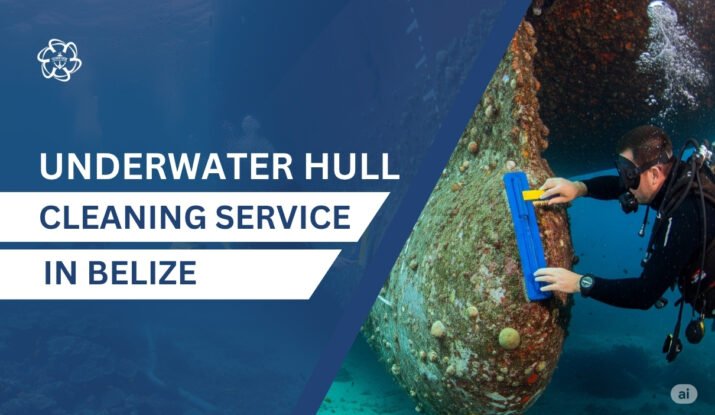Underwater hull cleaning in Belize: Belize maritime gem of vibrant coral reefs, thriving marine biodiversity, and clear Caribbean waters. But beneath the waves, vessel hulls face a persistent adversary: biofouling—the buildup of organisms like algae, barnacles, and slime that adhere to the underwater coating of ships. In Belize’s warm, nutrient-rich seas, fouling accelerates rapidly, compromising efficiency, raising emissions, and even violating international regulations.
At Marine Super Cargo , we offer an advanced solution: underwater hull cleaning in Belize using remotely operated vehicles (ROVs). Our technique is gentle, eco-conscious, and tailored for the specific environmental sensitivities of Belize. Here’s an in-depth guide from hull science to operational excellence, all while safeguarding Belize’s marine heritage.
Understanding Hull Fouling: What’s at Stake
a. The Fouling Spectrum
- Microfouling: slimy biofilms that form within days.
- Macrofouling: larger organisms like barnacles, mussels, hydroids, and seaweed.
- Hard fouling: frequently in tropical zones, coral or bryozoans attach to submerged surfaces.
b. Fouling’s Unsightly Impact
- Up to 30% drag increase, meaning reduced speed and agility.
- Fuel consumption spikes by 5–15%, sometimes more in tropical zones.
- Emission costs rise, including CO₂, NOx, and particulate pollutants.
- Anti-fouling coatings degrade faster, shortening paint life and increasing maintenance costs.
- Invasive species risk: Trapped organisms can be transported to new environments, conflicting with IMO standards.
The Case for Professional Underwater Cleaning in Belize
Belize’s marine environment is protected and regulated, cleaning practices must reflect ecological wisdom.
a. Why Manual Diver Cleaning Fails
- May chip or scratch hull coatings.
- Rubber scrapers can damage paints and decrease their lifespan.
- Risk of accelerating invasive species spread or damaging coral fragments.
- Safety hazards for divers in busy ports, busy waters, or poor visibility.
b. Why ROV Cleaning Is Superior
- Low-pressure water jets remove fouling without harming surface coatings.
- Cameras record and validate cleanliness in real-time.
- Onboard filtration collects all waste—no residue left behind.
- No divers needed, increasing safety and insurance compliance.
Marine Super Cargo’s system embodies the pinnacle of these benefits, optimized for Belizean waters.
How Marine Super Cargo Executes Underwater Hull Cleaning in Belize
From scheduling to reporting, our approach ensures efficiency with minimal maritime disruption.
a. Step 1: Pre-Operation Planning & Coordination
- Vessel data (hull shape, coating type, fouling history) collected electronically.
- Cleaning window agreed upon: anchorage vs. dock slot.
- Port authority notifications are managed by us to ensure regulatory compliance.
b. Step 2: ROV System Deployment
- Equipment readied on site; no dry-docking required.
- The ROV enters the water and begins its controlled cleaning pass along the hull.
- Live-feed video allows constant adjustments for optimal results.
c. Step 3: Waste Suction & Multi-Stage Filtration
- Dislodged organisms are immediately captured by suction.
- Filtration happens through fine sieves and settling tanks onboard.
- Waste is stored and disposed of properly by local waste protocols.
d. Step 4: Detailed Reporting & Analysis
- High-definition photos (before/after) and video clips.
- Fouling-type classification and percentage coverage analysis.
- Cleaning performance summary, fuel efficiency recommendations, and next cleaning intervals.
- Delivered via secure cloud link within 48 hours.
Aligning with Environmental & Regulatory Standards
a. IMO’s Biofouling Guidelines (MEPC.207(62))
Marine Super Cargo supports operators in complying with global biofouling management standards—everywhere, including Belize.
b. Belize Customs & Port Authority Protocols
Belizean port regulations require strict prevention of species transfer. Marine Super Cargo’s zero-discharge policy meets or exceeds these standards.
c. Support for Blue Economy & Marine Conservation
Belize’s commitment to marine park protection demands eco-friendly maritime solutions. Our cleaning method protects reefs, seagrass beds, and sensitive habitats.
Vessel Types and Frequency of Cleaning in Belize
a. Commercial Cargo & Bulk Carriers
Schedule cleanings every 8–10 weeks, especially if routes pass through high-fouling waters.
b. Ferries & Passenger Vessels
Given frequent port calls, schedule bi-monthly cleanings to maintain speed and schedule reliability.
c. Idle or Relocated Vessels
Before recommencing operations or relocating seasons/regions, ensure Underwater hull cleaning in Belize to avoid contamination issues.
Economic and Environmental Benefits: Underwater hull cleaning in Belize
a. Efficiency Gains
- Up to 12% fuel savings can equal thousands in annual savings—even on medium-sized vessels.
- Speed gain of 5–8%, valuable in tight shipping schedules.
b. Emissions Reduction
- Lower CO₂ and NOx emissions contribute to corporate sustainability and meet tougher environmental regulations.
c. Maintenance Cost Reduction
- Gentler cleaning preserves antifouling paints, delaying repaint cycles and dry-docking costs.
- In a marine environment like Belize, with high fouling rates, this can mean significant savings.
d. Brand Reputation & Market Access
- Eco-conscious operators attract passengers, charterers, and corporate partners.
- Compliance with sustainability policies enhances market positioning.
Real World Impact: A Case Story from Belize Waters
Scenario Recap
A 2,000 HP cargo vessel experienced a 20% increase in fuel use over five regional trips due to fouling.
Marine Super Cargo Intervention
- A 6-hour ROV hull cleaning while anchored near Belize City.
- Suction-filtered, with 96% fouling captured and disposed of.
- Delivered analysis showing 65% biofouling across the hull perimeters.
Conclusion
Fouled hulls slow vessels, raise fuel costs, and harm Belize’s marine ecosystems. Marine Super Cargo offers a smarter solution with eco-friendly, ROV-powered underwater hull cleaning in Belize, boosting performance while protecting the sea.
Ready to clean your hull and cut costs?
Choose Marine Super Cargo for efficient, sustainable underwater hull cleaning in Belize.
FAQs:
1. Can you clean while the vessel is loading/unloading?
Yes. Our ROV works independently, allowing simultaneous cargo/fuel operations.
2. Is there any risk to underwater sensors or thrusters?
Our ROV operators are trained to avoid sensitive appendages—high-pressure jets are focused on hull surfaces only.
3. How soon can I schedule cleaning once I decide?
Typically, within 24 hours, subject to weather and dock time availability.
4. What if I have multiple vessels in Belize?
We offer fleet scheduling, bulk discounts, and simplified logistics coordination.
5. Does this service work worldwide?
Yes—our global fleet deploys similar hull cleaning tech in major ports internationally.


